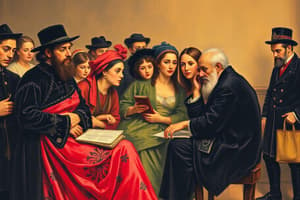Podcast
Questions and Answers
What is social order?
What is social order?
The way in which social honor is distributed in a community between typical groups.
What is economic order?
What is economic order?
The way in which goods and services are distributed.
What encompasses the phenomena of the distribution of power?
What encompasses the phenomena of the distribution of power?
Classes, social status, parties.
How does Weber define class?
How does Weber define class?
What are some communal actions that directly determine class situation?
What are some communal actions that directly determine class situation?
What are status groups?
What are status groups?
How are status groups stratified?
How are status groups stratified?
How are classes stratified?
How are classes stratified?
What delineates classes from status groups?
What delineates classes from status groups?
What are the characteristics of a party?
What are the characteristics of a party?
What is Weber's theory on class?
What is Weber's theory on class?
What are Weber's four social classes?
What are Weber's four social classes?
What is the significance of class, status, and party?
What is the significance of class, status, and party?
Study Notes
Social Orders and Classifications
- Social Order: Distribution of social honor among community groups, influencing status and respect.
- Economic Order: Framework for the distribution of goods and services within society.
- Distribution of Power: Comprised of classes, social status, and political parties, indicating the dynamics of influence.
Definition of Class and Communal Actions
- Weber's Definition of Class: Determined by property ownership or lack thereof; economic status directly affects social positioning.
- Communal Actions Influencing Class Situation: Engaging in the labor market, participating in the commodities market, and involvement in capitalistic enterprises shapes class dynamics.
Status Groups and Stratification
- Status Groups: Comprised of individuals sharing similar prestige and lifestyle choices, forming social networks based on mutual respect.
- Stratification of Status Groups: Based on consumption patterns rather than economic production.
- Classes vs. Status Groups: Classes are linked to economic factors, while status groups arise from societal factors, reflecting differing social hierarchies.
Characteristics of Political Parties
- Party Composition: Can manifest in organized groups, such as clubs or state entities, aiming for collective goals.
- Societal-ization Through Communal Actions: Engagement in shared pursuits facilitates political power dynamics.
- Goals of Parties: Typically driven by a desire for power, organized through planned activities for collective causes.
Weber's Class Theory
- Types of Classes:
- Property Class: Individuals receiving income through asset ownership.
- Commercial Class: Those with privileges enabling control over production.
- Social Class: Collective category for those with similar access to production and goods.
Weber's Four Social Classes
- Privileged Class: Gained through education and property ownership.
- Property-less Intelligentsia: Educated individuals lacking property.
- Petty Bourgeoisie: Small traders like farmers and shopkeepers.
- Working Class: Labor force engaged in manual or non-skilled jobs.
Significance of Class, Status, and Party
- Represents fundamental elements of social inequality, influencing individuals’ roles and opportunities within society.
Studying That Suits You
Use AI to generate personalized quizzes and flashcards to suit your learning preferences.
Description
Explore key terms and definitions from Weber's theories on social order, economic order, and the distribution of power through this set of flashcards. Perfect for students looking to understand the dynamics of class, status, and party in society.




